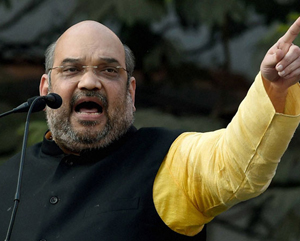Mumbai, Feb 17: The Shiv Sena on Monday said the ongoing preparation for the much awaited visit of US President Donald Trump is a reflection of the "slave mentality" of Indians.
Trump's India trip is like the visit of a "Badshah" (emperor), an editorial in Sena mouthpiece 'Saamana' said.
Taking a dig at the construction of a wall on a plot having several slum structures in Ahmedabad ahead of Trump's visit there, the Sena said the US president's trip would neither stop the fall of rupee's value in forex market nor offer betterment to those (slum dwellers) behind the wall.
"Before Independence, British King or Queen used to visit one of their slave nations like India. The kind of preparations going on from taxpayers' money for the arrival of Trump is similar to it. This reflects the slave mentality of Indians," it said.
The Sena also took a swipe at Prime Minister Narendra Modi over the Ahmedabad Municipal Corporation's (AMC) move to build wall on a plot to "hide the slums" on the route through which Trump's convoy would pass.
"Former prime minister Indira Gandhi had once given the slogan 'Garibi Hatao', which was ridiculed for a long time. It seems now Modi's plan is 'Garibi chupao' (hide poverty)," the Marathi publication said.
Is there any financial allocation for such a wall being built in Ahmedabad? Is the US going to offer loan to India to build such walls across the country? it wondered.
"We have heard Trump is going to be in Ahmedabad for only three hours but the wall construction is costing almost Rs 100 crore to the state exchequer," it said.
It is basically a political arrangement between Prime Minister Modi and US President Trump, the Sena claimed.
Last year, 'Howdy, Modi!' (a mega event jointly addressed by the Indian prime minister and Trump) was organised in the US, it noted.
A similar programme, "Kem Chho Trump" (Gujarati expression for how are you Trump), has been now organised (in Ahmedabad) ahead of the US elections, chiefly because of a sizable number of Gujarati people living in America, the Shiv Sena claimed.
"But this visit of President Trump is neither going to stop further fall of rupee in the forex market nor offer betterment to those behind the wall (being built in front of slums in Ahmedabad)," it said.
The Sena said Trump is "not someone very wise or a statesman or someone who cares for the whole world", but he has to be treated with respect as he represents the mighty US.
"Sometimes you have to treat someone with respect to get your things done," it quipped.
The AMC on Friday said the construction of the wall, around four feet in height, was approved much before Trump's Gujarat visit was finalised.
Trump is scheduled to visit Modi's home state Gujarat on February 24.
He will visit the famous Sabarmati Ashram in Ahmedabad and take part in a roadshow with Modi. After that, the two leaders will inaugurate a new cricket stadium in Motera and address a gathering there, with an expected audience of over a lakh people.
While it was earlier speculated that the programme would be called 'Kem Chho Trump', the Ahmedabad Municipal Corporation on Sunday tweeted a series of posters confirming that the event is now christened as 'Namaste Trump', apparently to give it a pan-India appeal.






Comments
Chutiya bangladeshisare attacking Hindus in WB, where are those SOB's who did rally in the name of #notin my name ?
Please qidmat k mauka de guzarish hogi
hang them till death , sharia law
But who killed them????
You and your goons only.
do not compare with previous government, it is your job to eliminate all sort of lynching around....take action on all who committed it as of now and make sure that it will not happen again....why it is happening only on muslims....there are people eating beef from other community.... and beef export factories exporting beef everyday basis with no problems...if you have guts stop it....
True lynching was happening in previous government also and before since Gandhi's assassination , but Mr. Cha most all lynching was carried out by your OWN associated party(BJP) and wings (RSS)
Add new comment